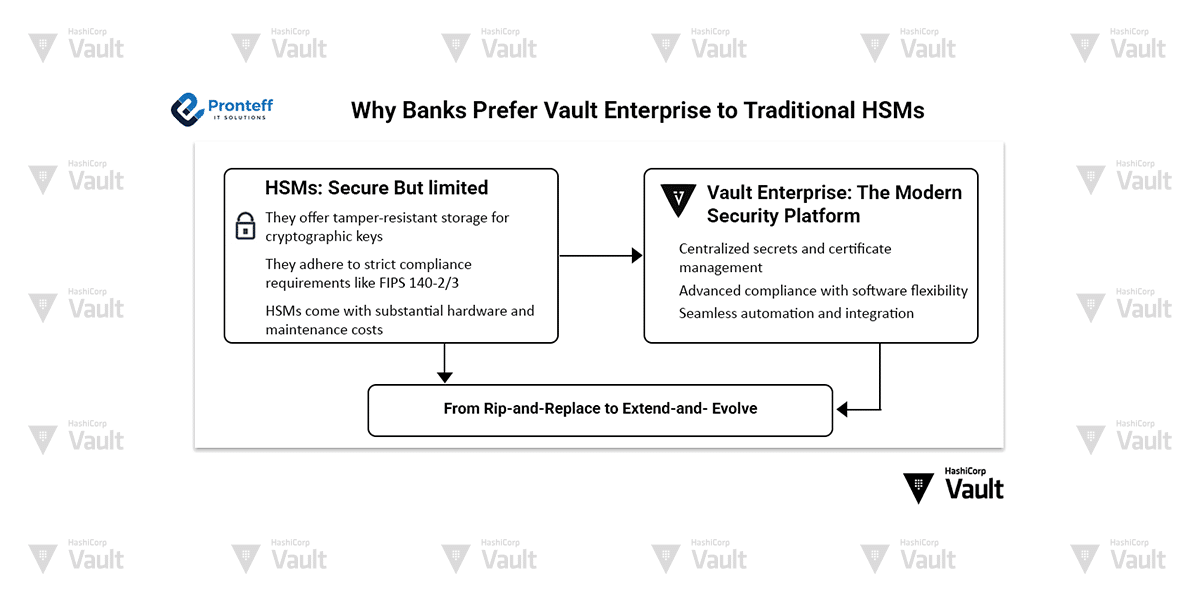Why Banks Prefer Vault Enterprise to Traditional HSMs
In this blog, we will learn why banks prefer vault enterprise to traditional HSMs.
As the banking industry accelerates its digital transformation, the need for agile, secure, and centralized secrets management has never been more critical. Many banks continue to rely heavily on Hardware Security Modules (HSMs) for cryptographic key management. However, in modern, dynamic IT environments—especially those adopting containers, microservices, APIs, and hybrid cloud architectures—HSMs alone are not enough.
This blog explores why banks should evolve beyond traditional HSMs and adopt HashiCorp Vault Enterprise—either as a complementary solution or a full replacement—to unlock greater flexibility, automation, and security at scale.
HSMs: Secure But Limited
Hardware Security Modules are trusted for a reason:
- They offer tamper-resistant storage for cryptographic keys.
- They adhere to strict compliance requirements like FIPS 140-2/3
Yet, in practice, HSMs have clear constraints:
- Narrow Scope: HSMs are built for cryptographic operations only—key generation, storage, and signing.
- Manual Operations: Certificate renewal, API key rotation, and secrets injection require human intervention.
- HSMs incur considerable expenses for both hardware and upkeep.
- Poor Fit for DevOps: Integration with Kubernetes, CI/CD pipelines, or ephemeral workloads is either non-existent or complex.
As banks digitize and scale rapidly, these limitations become bottlenecks.
Vault Enterprise: The Modern Security Platform
HashiCorp Vault Enterprise is a software-based secrets management platform designed for modern workloads. It provides:
Centralized Secrets and Certificate Management
Vault goes beyond keys:
- TLS/SSL certificates
- API keys
- Database credentials
- Encryption keys and tokens
- Application secrets
All managed centrally, with full audit trails and policy enforcement.
Advanced Compliance with Software Flexibility
Vault offers:
- Built-in FIPS 140-2 and 140-3 compliance as a Software Security Module (SSM)
- Granular RBAC and Sentinel policies
- Comprehensive audit logs capture details of who accessed which resources, when, and by what means.
This enables financial institutions to meet RBI, PCI-DSS, and GDPR requirements—without the rigidity of hardware.
Seamless Automation and Integration
Vault supports:
- Dynamic secrets (short-lived credentials that auto-expire)
- Auto-renewing certificates with notification hooks
- Secrets injection into Kubernetes, CI/CD pipelines, and runtime apps
- REST APIs, agents, and templates for full lifecycle automation
This is crucial for banks modernizing their applications using containers, OpenShift, and cloud-native stacks.
From Rip-and-Replace to Extend-and-Evolve
The good news? Banks don’t need to throw away existing HSMs. Vault supports hybrid architectures:
Suggested Migration Path:
- Start Small: Manage TLS certs or API keys for one app (e.g., e-Mudra)
- Integrate HSMs: Use Vault with PKCS#11 to unseal or delegate crypto to HSM
- Segment by Namespace: Use Vault namespaces (e.g., eMudra/, UPI/, SWITCH/) for multi-tenancy
- Expand Coverage: Gradually onboard secrets, certs, and keys from other applications
This approach minimizes risk and avoids disruption while gaining Vault’s full benefits.
Vault vs. HSM – At a Glance
| Feature | HSM | Vault Enterprise |
|---|---|---|
| scope | Cryptographic keys only | Secrets, certs, API keys, encryption-as-a-service |
| Compliance | FIPS 140-2/3 (hardware-based) | FIPS 140-2/3 (software module) + Sentinel, audit |
| Automation | Minimal | Dynamic secrets, renewals, policies, webhooks |
| DevOps & Cloud Fit | Poor | Native integrations with K8s, CI/CD, cloud |
| Cost & Scalability | Expensive, hard to scale | Flexible, runs on standard infra or containers |
| Multi-Tenancy & Segmentation | Complex | Namespaces + per-tenant secrets, policies, auditing |
Final Word: HSMs Secure Keys—Vault Secures Your Entire Digital Ecosystem
For banks, security isn’t just about protecting a key—it’s about protecting access, credentials, certificates, and data flows across a complex, hybrid IT estate.
HashiCorp Vault Enterprise empowers banks to:
- Centralize and automate secrets and certificate management
- Modernize without compromising on compliance
- Enable secure-by-design DevOps practices
- Extend existing HSM investments while preparing for the future
Vault doesn’t just replace HSMs. It completes your security strategy.








